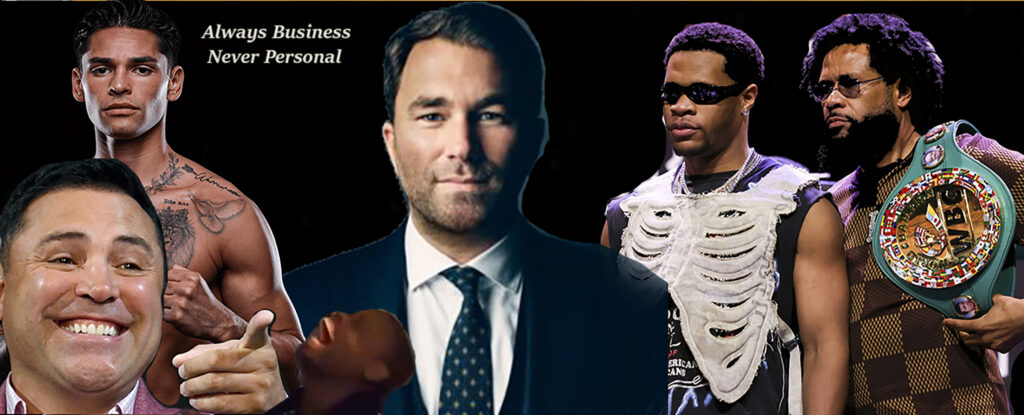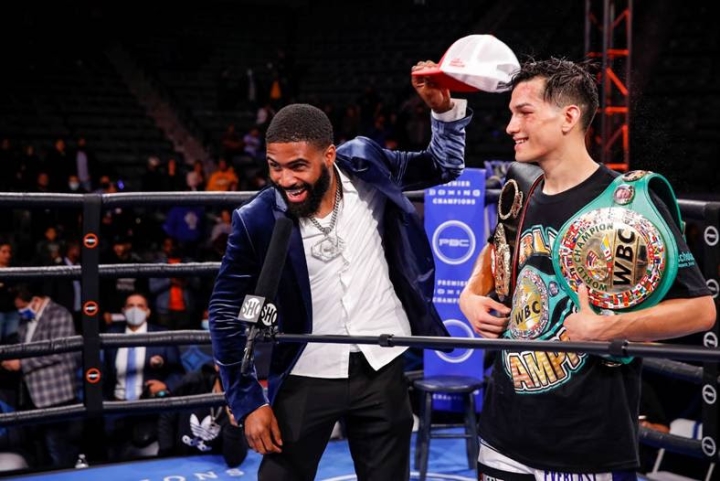
Devin Haney vs Golden Boy: What The Lawsuit Revealed.
Article By: John Green
It has recently come to light that Devin Haney and his father, Bill Haney, are not only suing Golden Boy Promotions over the outcome of Devin’s bout with Ryan Garcia but Reports suggest that Oscar De La Hoya may have “paper gangstered” the Haneys in these negotiations, leaving them financially disadvantaged.
At the heart of the issue is the contract Devin Haney signed with Golden Boy Promotions, which outlined that Haney would receive 47% of the net profit from the bout with Garcia. While this may appear favorable at first glance, experts have pointed out that agreeing to a net profit share—rather than a gross revenue split, which Gennadiy Golovkin secured in similar situations—could mean a significant financial loss. Depending on expenses deducted, net profit payouts can fluctuate, often leaving fighters with less than expected.
This contractual decision has sparked debate among industry insiders and fans. Many question why the Haneys agreed to a net profit split in the first place, and some blame their decision to exclude promoter Eddie Hearn and Matchroom Boxing from the deal. Hearn, widely regarded for his business acumen and financial savvy, learned from his father, Barry Hearn, a distinguished chartered accountant. Given Hearn’s track record, it is believed he would have advised against such a potentially risky deal.
Hearn’s long-standing relationship with the Haneys is well documented. He was instrumental in Devin’s early career, helping him secure major television exposure and guiding him through the complexities of the boxing business. Hearn even supported Devin’s temporary move to Top Rank, which led to him becoming the youngest undisputed champion in the sport’s history. After returning to Matchroom, Haney’s stock soared following a win over Regis Prograis, where he captured a title in a second weight division.
However, despite their successes, the Haneys seemingly chose to enter the Ryan Garcia negotiations without Hearn’s involvement. Industry sources suggest that the Haney camp, perhaps buoyed by their rising status, believed the fight would generate massive pay-per-view numbers akin to the Gervonta Davis vs. Ryan Garcia event. But this confidence may have contributed to their failure to secure a more favorable revenue split, and the consequences have played out publicly.
The Haney-Garcia fight itself was overshadowed by a series of controversies—from missed weight issues to allegations of drug violations—culminating in the current legal dispute. While some fans see the lawsuit as an inability to accept defeat, others believe the Haneys are taking a principled stand against unfair practices within the sport. With boxing lacking a central governing body, critics argue it’s all too easy for fighters to be financially shortchanged during negotiations.
Adding to the drama, tensions between Devin Haney and Eddie Hearn recently spilled over onto social media. In a heated Twitter exchange, Hearn bluntly reminded Haney, “You’re not my fighter, I don’t owe you anything.” The once-strong relationship between the Haneys and Matchroom now appears fractured, leaving Devin without the backing he previously enjoyed.
As Devin Haney navigates this legal battle, many are left wondering about his next move—both in and out of the ring. Can he recover from this high-profile contractual dispute and reclaim his place as one of boxing’s brightest young stars? And, perhaps more importantly, will he and Eddie Hearn reconcile, or has their once-powerful partnership come to an end?
Only time will tell if this lawsuit becomes a defining setback or a critical turning point for the Haneys. But one thing is clear—both in the ring and in the courtroom, Devin Haney faces formidable opponents in the fight for his future.


